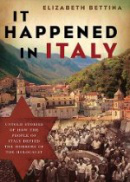Book tells largely untold story of Jews rescued in Mussolini's Italy

During World War II, Fascist Italy under Mussolini was allied with Nazi Germany. In Italy, Jews were persecuted first by Fascism and then by Nazism. Yet, next to Denmark, Italy had the highest survival rate for Jews in any Nazi-occupied country - much less a country allied with Hitler. Eighty percent of Italian Jews survived the war - as did thousands of foreign Jews who found refuge in Italy. The story of their survival is one that has been largely untold.
"Jews have been a part of Italian history and the history of Rome for over two thousand years," writes Ida Garibaldi in Issues. "Indeed, the first Jews arrived on the Italian peninsula in 586 BC, and Jews have been living in Rome continuously since the Second Century BC.... "
An important new book: It Happened In Italy (Thomas Nelson) tells the story of how many Italians - from all walks of life - helped to save Jews. Author Elizabeth Bettina is an Italian-American who, as a child, visited her family's village of Campagna in southern Italy.
After she met Holocaust survivors in New York who told her stories of surviving World War II in Campagna and surrounding villages, she began to study the story of heroism of many Italians as they confronted the Nazi goal of eliminating Europe's Jews.
In the early l930s, Hitler was prepared to let Jews emigrate, but other countries were unwilling to receive them. Only Italy - with Mussolini in power - permitted German and Austrian Jews to enter the country without visas. They lived peacefully until, as a result of Italy's alliance with Germany, foreign Jews were to be interred.
Elizabeth Bettina tells the story of Giovanni Palatucci, "the Italian Schindler." An Italian police officer in the early l940s, he actively defied orders to implement Hitler's Final Solution. For his heroism, Palatucci was killed at Dachau. In 2002, he was recognized for
his efforts and was beatified - a step before sainthood - by the Vatican.
Bettina writes: "His role in Fiume was Questore, which can best be described as part police chief, part immigration officer, and part census officer. All foreign residents of Italy were required to register... and this gave Palatucci access to their documents and personal information, including their religion... Palatucci hid this list from the Nazis, because he knew that... it was a map that led directly to almost certain death for the Jews on the list. He enabled people to leave Italy by supplying false documents, and if they couldn't leave Italy, Palatucci arranged to send them to an official Italian government internment camp in Campagna, the former Convent of SanBartolomeo, where his uncle Giuseppe Maria Palatucci, was the bishop.... Once the Nazis figured out what Giovanni Palatucci was doing, they sent him to Dachau, where on February l0, l945, he died the death from which he saved thousands of Jews (some estimates are as high as 5,000). Just two months later, on April 29, l945, Dachau was liberated."
In occupied Europe, approximately 75 to 80 percent of the Jewish population was executed. Yet in Italy, approximately 75 to 80 percent of the Jewish population survived.
Bettina interviewed many Jews who survived the war in Italy. One was Walter Wolff, arrested by the Germans and sent to Dachau on November l0, l938, the day after Kristallnacht. His brother Bruno was sent to Buchenwald. Their crime was being Jewish.
Walter and Bruno found their way to Italy, and in June l940 Walter was arrested in Genoa. His crime was being Jewish. Walter said more than 65 years later: "Now I was back in the same boat, except the Italian camps were nothing like the German camps. There was no forced labour in the Italian camps. We could do whatever we wanted during the day.... to pass time, we played cards, took walks around the little village, read books, or played soccer at a field just outside down. We even had our own orchestra and performed for the local residents."
It Happened In Italy is filled with such stories. An earlier book, The Assisi Underground: The Priest Who Rescued Jews by Alexander Ramatias told by Padre Rufini Niccacci, tells how 300 Jews were sheltered and protected by a peasant turned priest, Father Ruffino Niccacci. He dressed many of them as monks and nuns, taught them Catholic rituals, and hid them in monasteries. The town printing press, which during the day printed posters and greeting cards, at night clandestinely printed false documents for Jews all over Italy.
Addressing the nuns of a cloistered order, Father Niccacci said: "Once more we live in the Dark Ages. The men and women who have come to you today to seek refuge and protection are the lepers of the modern world. They are Jews who are being persecuted by the Germans and the Fascists, sent to concentration camps, then tortured and put to death. We are God's sons and daughters and we, brothers and sisters, have much more to answer for than ordinary people. We must take these lepers in our arms, offer them our protection, and hide them from our oppressors...."
Father Niccacci asked Cardinal della Costa, Archbishop of Florence, why Pope Pius XII had not made a statement condemning the Nazi persecution of the Jews. The Cardinal replied: "Instead of making meaningless declarations that would only antagonize the Germans, and perhaps even make them occupy the Vatican itself, he issued orders to save Jewish lives. The Pontiff could not issue an express order. But we received his message loud and clear. How would Pietro Boetto in Genoa, Niccolini in Assisi, I here, and so many other archbishops and bishops all over Italy, provide a sanctuary for the Jews, if we did not feel that this was what His Holiness would wish us to do?... In his own diocese - and don't forget the Pope is also Bishop of Rome - over a hundred convents and over fifty churches and theological seminaries are hiding 4,000 Jews, half of the Jews of Rome."
The role of Pope Pius XII and the Vatican during World War II will continue to be a subject of debate. What cannot be debated, however, are the stories told by Elizabeth Bettina in her book. While some Italians acted badly, participating in the Nazi assault upon Jews, others acted well - and bravely. It is from these that all of us can learn lessons for the future.
Source: fgfBooks.com
It Happened In Italy by Elizabeth Bettina publisher: Thomas Nelson is available through the ICN bookshop.


















